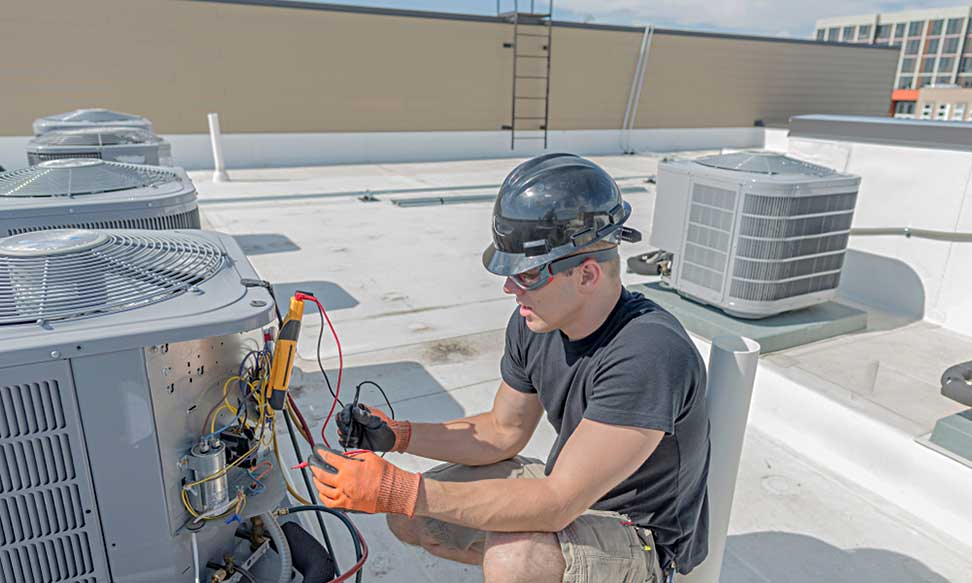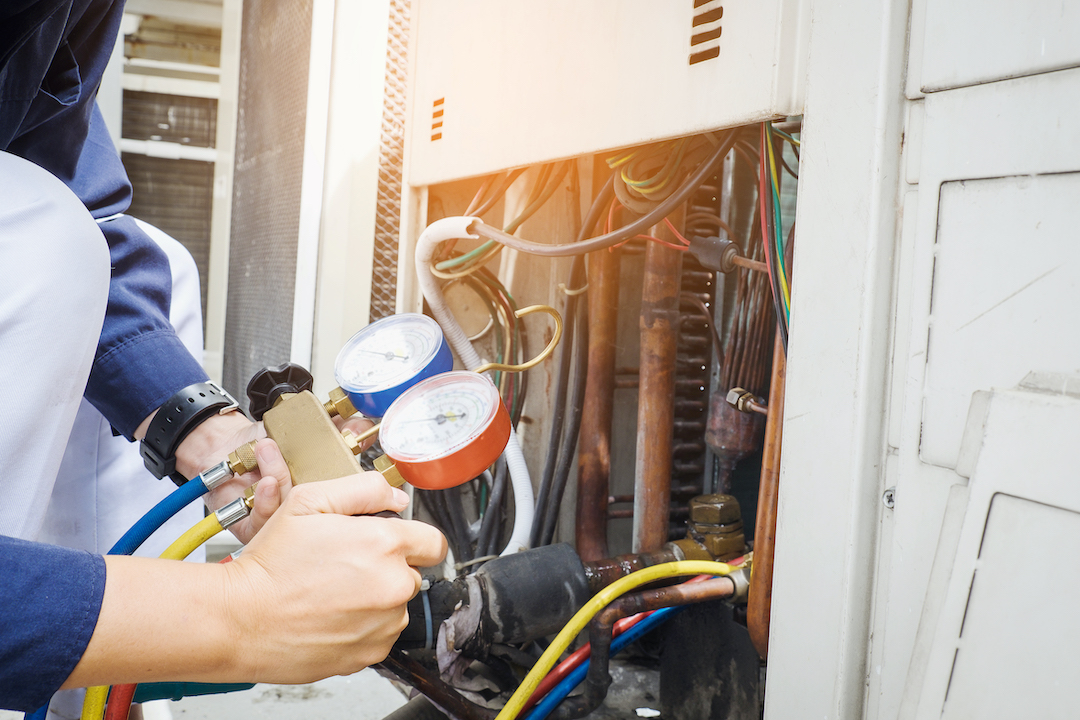Advice from Technicians on heat pump installation ooltewah tn
Advice from Technicians on heat pump installation ooltewah tn
Blog Article
Selecting In Between a Heat Pump and Heater: Secret Factors To Consider for Your A/c Demands
When reviewing heating options for a/c needs, the decision in between a heat pump and a furnace can be complicated. Each system uses distinctive advantages customized to specific environments and energy performance goals. Comprehending these differences is necessary for making an informed selection. Trick factors such as installation prices and environmental effect additionally complicate the choice procedure. Which choice truly lines up with one's comfort and sustainability choices? The complying with areas will discover these considerations carefully.
Recognizing Heat Pumps: Exactly How They Function and Their Advantages
While several homeowners consider different home heating choices, comprehending how warmth pumps function and their benefits can considerably affect their decision. Heatpump operate by transferring heat as opposed to generating it. In the wintertime, they draw out warmth from the outdoors air or ground and move it indoors, while in the summertime, they reverse this procedure, cooling down the home by eliminating heat outside. This double capability makes them functional for year-round climate control.One of the key benefits of heatpump is their power efficiency. They use considerably less power contrasted to traditional heater, potentially leading to reduced energy bills (heat pump replacement ooltewah tn). In addition, heatpump have a smaller carbon impact, making them an environmentally pleasant option. They likewise need much less upkeep than traditional systems, adding to long-lasting expense financial savings. Generally, recognizing the technicians and advantages of heat pumps can help property owners make notified choices regarding their home heating and cooling demands
Checking Out Furnaces: Types, Procedure, and Benefits
Furnaces can be found in various types, including gas, electrical, and oil designs, each with unique functional mechanisms. Comprehending these distinctions is vital, as they influence effectiveness and home heating performance. Furthermore, furnaces supply many advantages, such as regular heat result and reliability in chillier climates.
Kinds of Furnaces
Heater can vary significantly in design and operation, with heating systems being a prominent selection among house owners. There are a number of types of heaters, each utilizing different fuel resources and technologies. Gas furnaces prevail, leveraging all-natural gas to generate heat efficiently. Electric heaters, on the other hand, make use of electrical resistance to generate warmth, often preferred for their uncomplicated installment. Oil heaters, while less typical, are efficient in locations with limited gas gain access to (heat pump service). In addition, condensing heating systems take full advantage of power effectiveness by recycling and recording exhaust gases. Each kind operates with a system of warm exchangers and ductwork to distribute warm air throughout a home. Understanding the differences between these heater kinds is necessary for educated HVAC choices
Advantages of Heaters
For house owners looking for reliable heat during cold months, the advantages of furnaces are significant. Heating systems give constant home heating, making certain even temperatures throughout the home. They are specifically reliable in extreme chilly, usually exceeding heatpump in cold conditions. Various kinds, including gas, electrical, and oil heaters, use adaptability to fulfill varied demands and preferences.Furnaces additionally tend to have reduced initial installation expenses contrasted to heat pumps, making them an extra available choice for numerous. Their durable layout adds to a longer life expectancy, with numerous units lasting over 15 years with appropriate maintenance. Furthermore, contemporary heaters are typically furnished with advanced modern technology for enhanced performance, which can result in lowered energy costs. On the whole, heating systems continue to be a reliable selection for reliable home heating.

Energy Efficiency: Comparing Warmth Pumps and Furnaces
When comparing energy performance between heatpump and heating systems, the Seasonal Power Effectiveness Ratio (SEER) plays an important duty in establishing performance. Furthermore, a functional expense evaluation reveals the lasting economic ramifications of each system. Comprehending these elements can guide homeowners in making notified decisions concerning their home heating remedies.
Seasonal Energy Efficiency Ratio
Energy effectiveness plays a crucial duty in the decision-making procedure in between heatpump and heaters, specifically when taking into consideration the Seasonal Power Efficiency Ratio (SEER) This metric procedures the cooling efficiency of heatpump over a whole air conditioning period, providing a standard means to examine performance. Higher SEER ratings suggest better energy performance, equating to reduced energy consumption and reduced utility expenses. On the other hand, furnaces are normally analyzed utilizing the Yearly Gas Application Performance (AFUE) score, which reflects heating effectiveness. When comparing these two systems, property owners should focus on SEER scores for heatpump, as they directly influence overall energy savings and ecological sustainability. A complete understanding of SEER can especially influence the lasting complete satisfaction and cost-effectiveness of the picked a/c service.
Functional Expense Evaluation
Recognizing the operational costs connected with warmth pumps and heating systems is important for homeowners assessing their options. Heat pumps generally offer higher power performance, converting electric energy right into warmth with marginal waste. This leads to reduced monthly energy costs, particularly in modest environments. Alternatively, standard heating systems, specifically gas versions, may have lower upfront prices however can incur higher functional costs over time because of sustain costs and effectiveness ratings.Moreover, heatpump can work as both home heating and cooling down systems, potentially minimizing the demand for separate heating and cooling units. While initial financial investments for heatpump may be greater, their long-lasting savings in energy effectiveness can make them a more economical choice for many homes. Cautious analysis of neighborhood energy rates is vital to determine the ideal choice.
Installation Prices: What to Anticipate for each and every Heating Unit
Installation costs for home heating systems can vary considerably in between heat pumps and heaters, affecting property owners' decisions. Heatpump generally have higher ahead of time setup expenses, generally ranging from $3,500 to $8,000, depending on the unit size and pop over to this web-site complexity of installment. This includes the outdoor device, indoor handling system, and required ductwork alterations. Conversely, heaters often tend to have reduced first prices, balancing between $2,500 and $6,000, which can be appealing for budget-conscious property owners. Installment costs can increase if extensive ductwork is required.Moreover, the choice of gas kind for heaters-- natural gas, lp, or electric-- can likewise impact setup costs. While warm pumps provide energy performance, their initial financial investment may prevent some buyers. Ultimately, reviewing setup prices together with long-lasting savings and effectiveness will certainly assist home owners in making informed decisions concerning their heater.
Environment Considerations: Which System Performs Better in Your Area
How do environment problems affect the effectiveness of home heating systems? The performance of heatpump and heating systems can vary considerably depending upon the regional climate. In modest environments, warm pumps succeed by successfully transferring warmth from the outside air, making them an energy-saving option. Nevertheless, their performance lessens in incredibly cool temperatures, where they may have a hard time to draw out adequate warmth. On the other hand, furnaces, especially gas designs, give trusted and regular heat regardless of outside conditions, making them more suitable in chillier regions.In areas that experience milder winter seasons, heatpump can operate successfully year-round, supplying both heating & cooling. In contrast, areas with severe winters months commonly profit from the robustness of heaters. Ultimately, recognizing the go to this website local climate is necessary when making a decision in between a heatpump and a furnace, as it straight impacts their functional efficiency and total efficiency.
Maintenance Demands: Long-Term Look After Warm Pumps vs. Furnaces
While both warmth pumps and heating systems call for routine maintenance to assure peak performance, their particular requirements and care regimens differ substantially. Heaters normally require less constant focus, with yearly inspections being adequate to look for gas leakages, clean filters, and examine overall functionality. Their less complex design commonly allows for simple repairs.In comparison, heatpump demand semiannual upkeep because of their double duty in heating & cooling. This includes cleaning coils, examining cooling agent degrees, and guaranteeing that both the outdoor and interior units work at their finest. Additionally, heat pump maintenance typically involves more complex elements, making professional servicing essential.Neglecting upkeep can bring about reduced performance and boosted energy expenses for both systems. Eventually, home owners should think about these long-lasting treatment needs when picking between a heatpump and a furnace, as aggressive upkeep can expand the life-span and performance of either system considerably.
Environmental Impact: Picking a Sustainable Heating Alternative
The environmental impact of heater is a critical analysis for house owners looking for lasting alternatives. Heatpump are typically a lot more energy-efficient than traditional furnaces, as they transfer warmth instead of generate it, considerably reducing carbon emissions. By using renewable power sources, such as air-source or geothermal heat pumps, property owners can further decrease their eco-friendly footprint.On the various other hand, all-natural gas heating this post systems send out greenhouse gases and add to air contamination, though they usually give higher heat outcome. Nonetheless, advancements in technology have actually caused the development of high-efficiency furnaces that minimize emissions.Ultimately, choosing a heater includes considering effectiveness versus environmental impact. Home owners are urged to assess regional power resources and rewards for renewable systems, guaranteeing a choice that straightens with both individual comfort and ecological duty. The decision affects not just instant comfort but likewise lasting sustainability and environmental health and wellness.
Regularly Asked Questions
How Lengthy Do Heat Pumps and Furnaces Normally Last?
The life expectancy of heat pumps typically varies from 15 to twenty years, while furnaces can last in between 15 to 30 years. Normal maintenance considerably affects their long life and performance in offering home heating services.
Can I Use a Heatpump in Extremely Cold Climates?
Warmth pumps can run in exceptionally cool climates, but their performance decreases as temperatures decrease. In such conditions, additional home heating sources may be needed to maintain comfy interior temperature levels and assure peak performance.

What Is the Sound Degree of Warm Pumps Versus Furnaces?
The noise degrees of heat pumps and furnaces differ considerably. Generally, warm pumps run even more quietly than conventional heating systems, making them preferable for those delicate to sound, while heating systems might generate louder operational noises during heating cycles.
Are Warmth Pumps Suitable for Both Heating & Cooling?
Warm pumps are undoubtedly appropriate for both heating and cooling (furnace replacement). They operate by moving warmth, offering efficient temperature level control year-round, making them a functional choice for property owners seeking an all-in-one a/c solution
What Dimension Heating Unit Do I Required for My Home?
Figuring out the proper dimension home heating system for a home calls for reviewing factors such as square video, insulation top quality, local environment, and the home's format. Consulting a professional can guarantee an accurate analysis and ideal comfort. Warm pumps normally provide higher power performance, transforming electric power into warm with marginal waste. In moderate climates, warm pumps excel by effectively transferring heat from the outside air, making them an energy-saving choice. On the other hand, heating systems, particularly gas designs, give dependable and consistent heat no matter of outside conditions, making them better in cooler regions.In areas that experience milder wintertimes, warmth pumps can operate efficiently year-round, giving both home heating and air conditioning. Warmth pumps are generally much more energy-efficient than conventional furnaces, as they move heat rather than produce it, greatly minimizing carbon discharges. By making use of sustainable energy sources, such as air-source or geothermal warm pumps, home owners can even more minimize their environmental footprint.On the other hand, natural gas furnaces discharge greenhouse gases and contribute to air pollution, though they often provide higher warm outcome.
Report this page